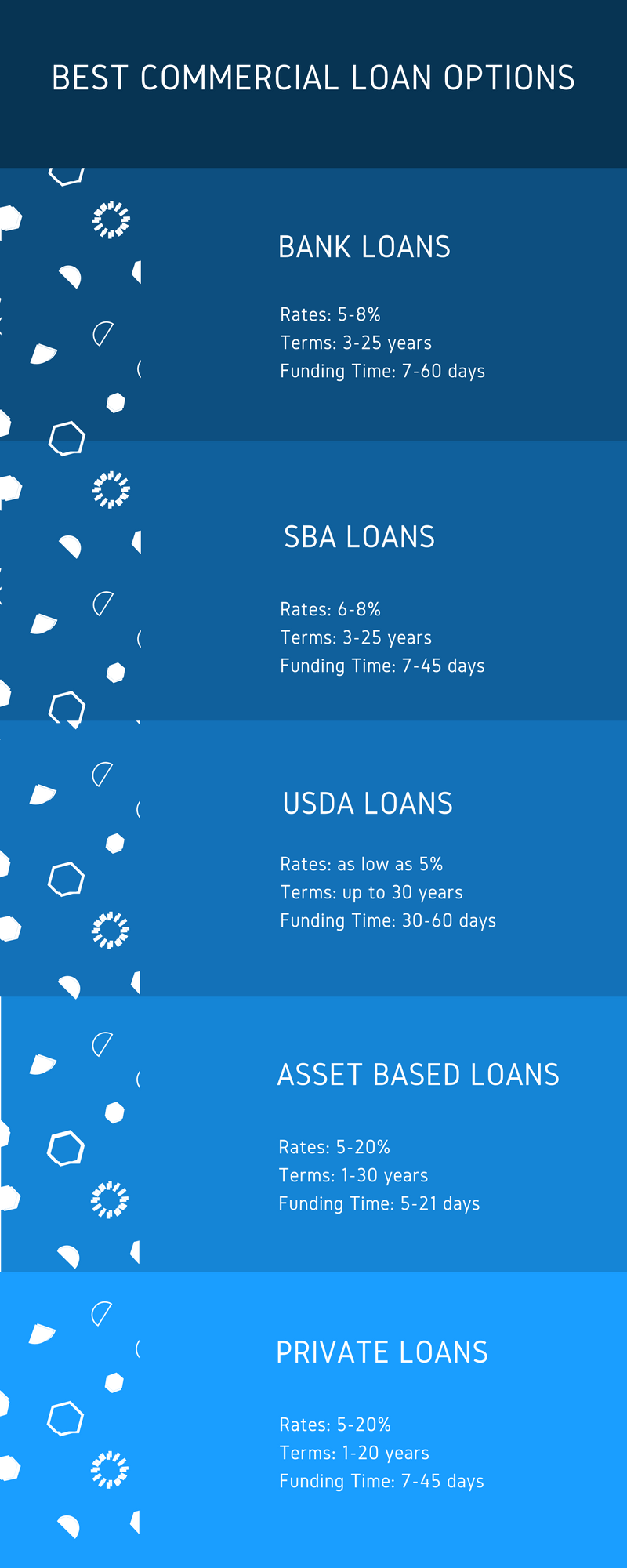Commercial Loan Brokerages
Everyday businesses are seeking some sort of financing for their businesses, but what these businesses find out quickly is that there are thousands of lenders out there over tens of thousands of different lending products. The thought of applying to any number of these lenders is a daunting task, that can become a nightmare if you waste your time applying to the wrong lender. Thankfully, there are business loan advisors and business loan brokers that understand all the lending options, and can help a business owner or commercial investor find the best possible financing option to make sure their company or investment thrive. In this article, we will look at business loan brokers and commercial loan brokers, and the services they offer.
What is a Commercial Loan Broker?
A commercial loan broker is someone who specializes in helping small business owners and investors connect with loans for their business or commercial uses. In theory, a commercial loan broker will be well-versed in every aspect of commercial finance, and will provide a business owner with guidance on how to get a business loan. Additionally, a commercial loan broker should also have access to a large network of commercial lenders in which they can connect their client with to receive the appropriate financing for their company. Even more, a good commercial loan broker will help the business owner negotiate the rates and terms of the business loan, to help ensure the client gets the best rates possible.

When Does it Make Sense to Use a Commercial Loan Broker?
- To Learn About Business Financing Options: No business owner wants to overpay for a loan because they failed to properly-inform themselves of their options. A good commercial loan broker will help a business owner understand all the different funding options, and help steer the business owner to the best financing option that will help their business grow short, medium and long-term.
- Access to Lenders: There are thousands upon thousands of lenders available that are willing to provide small businesses with financing. But simply going from lender to lender, seeking the right type of loan for your company or commercial investment is not only time consuming, but your also not guaranteed to have success in finding the right lender. If you do find a lender that may be a good fit, you’ll have to apply with a lower-level position and hope that you’ll get approved by underwriting. A good commercial loan broker has connections within many lending institutions that can streamline the approval and underwriting process, and help you get a loan quickly.
- Negotiate: Once you do find a lender that is willing to loan to your company, you will then need to negotiate fees and costs related to the loan. While many lenders feel small businesses should just accept the terms they present, a small business should always push back on the rates and fees to ensure they are paying the lowest rates available, without having to pay excessive closing and banking fees.
Disadvantages of Using a Commercial Loan Brokers:
- Costs: Many times, a commercial loan broker will receive compensation directly from the lender for referring loan applicants to the lender. As many lenders have outsourced their marketing efforts, they’ve instead focused their marketing budgets on paying referral fees. This helps free-up man hours for underwriting and other lending processes, but also helps the lender obtain qualified leads, and the broker will handle much of the prequalifying and gathering of documents before they send the loan application to the lender. This helps some lenders provide referral fees without affecting the cost of borrowing. But, there are times when a broker can directly affect the pricing of the loan or advance by adding additional referral fees directly into the loan or advances costs. So, if you are working with a commercial loan broker, you will want to talk to the broker about the fees, and if it will affect the cost of borrowing.
- Lack of Control of Documents: As we see time and time again, fraud is on the rise. When you work with a broker or lender, they will require you to send sensitive information including your name, phone number, date-of-birth, social security numbers, business EIN number along with other proprietary information. Additionally, they will ask for such documents including business tax returns, personal tax returns, business financial statements, bank statements, loan documents and other business documents. When you submit your personal and business information to a broker, you are putting a ton of sensitive information and documentation into their hands. You want to make sure you vet the commercial broker to make sure they are legitimate, and you also want to make sure you have an understanding of what lenders they are sending this information to.
- Possibly Running Credit Multiple Times: An unfortunate practice used by many commercial brokers is what’s called a “shotgun approach” to brokering. What this entails is a broker getting an application from a business owner, and then sending out the application to dozens of lenders, who will then run the business owners credit dozens of times. This is another reason why you want to ask the broker how many times they plan on sending out your application, and to which lenders the broker will be sending the file to.

Types of Commercial Loan Brokers:
Not all brokers specialize in all types of commercial loans, as some brokers have a focus on specific types of financing. Its important to understand what types of commercial brokers there are, the types of financing they specialize in, and the pool of lenders they have to work with in their network. Here are some of the types of commercial brokers:
- SBA Loan Broker: A SBA commercial loan broker specializes-in and should know the entire SBA funding process like the bank of their hand. SBA loans are essentially conventional loans provided by banks, community lenders, credit unions and non-profit lenders provided to small business and are backed by the Small Business Administration. By backing the loan with a SBA enhancement, the SBA lender will see their risk-exposure reduced, in that if the borrower defaults on their loan, the SBA lender will be on the hook for only a small percent, with the Small Business Administration covering the rest.
- Conventional Commercial Loan Broker: Conventional loan brokers focus on traditional term loans and lines of credit provided by traditional lending institutions. Conventional lenders tend to have good relationships with all the major banks, and understand all the details of commercial finance, and may have a good understanding of commercial real estate.
- Equipment Lease Broker: An equipment lease broker is able to connect borrowers seeking business equipment or machinery, with financiers who are willing to purchase the equipment for the small business, and then lease the equipment to the business for a period of time, with an option to outright purchase the equipment at the end of the lease.
- Franchise Loan Brokers: A good franchise loan broker will understand both the conventional and SBA processes, as those are the most common ways for entrepreneurs to acquire financing to purchase a franchise. Additionally, a good franchise loan broker should be able to help a franchisee negotiate commercial real estate loans, but also obtain any working capital they need to help ensure the franchise runs smoothly.
- Alternative Loan Brokers: This type of alternative commercial broker understands and helps borrowers seek financing from non-bank alternative lenders, marketplace business lenders, and online fintech business lenders. These types of loans are perfect for borrowers who have quality businesses, decent credit, and good cash-flow, but were unable to get approved and funded by a conventional lender. A good alternative commercial loan broker can help a business seeking working capital, inventory financing, payroll funding or other financing needs taken care of within a week or less.
- Merchant Cash Advance Broker: Recently brokers who offer access to merchant cash advances have rapidly increased in numbers. The reason why is because funding companies that offer merchant cash advances are willing to pay brokers and ISOs substantial commissions and referral fees to refer and help fund merchant cash advances. A good merchant cash advance broker will steer the borrower toward the healthiest, lowest cost merchant cash advance, and not to the merchant cash advance that will provide the broker with the highest commission.
- Commercial Real Estate Broker: This type of commercial broker helps businesses and investors obtain or refinance commercial real estate. A good commercial real estate broker will be able to offer their client with many commercial property financing options, including SBA real estate loans, conventional real estate loans, balloon mortgages, refinancing a mortgage, investment real estate loan, fix-and-flip financing, as well a bridge loans.
Summary
As you can see there are definitely some advantages and disadvantages of using a commercial loan broker. If you have enough time on your hand to investigate and research lenders and the funding options they provide, a commercial loan broker probably won’t be needed. But, if you need someone to help provide you expert guidance to ensure you get the best possible loan, as well as getting funded quickly, please reach-out to our specialists, and we will help you navigate the commercial loan process.




















